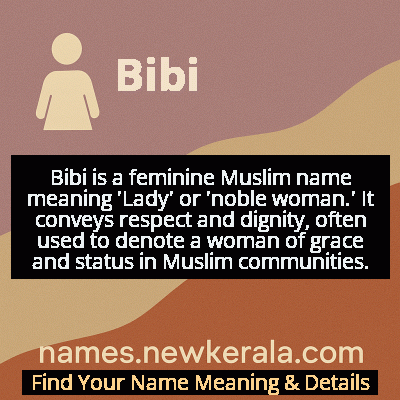Bibi Name Meaning & Details
Origin, Popularity, Numerology Analysis & Name Meaning of Bibi
Discover the origin, meaning, and cultural significance of the name BIBI. Delve into its historical roots and explore the lasting impact it has had on communities and traditions.
Name
Bibi
Gender
Female
Origin
Muslim
Lucky Number
4
Meaning of the Name - Bibi
Bibi is a feminine Muslim name meaning 'Lady' or 'noble woman.' It conveys respect and dignity, often used to denote a woman of grace and status in Muslim communities.
Bibi - Complete Numerology Analysis
Your Numerology Number
Based on Pythagorean Numerology System
Ruling Planet
Uranus (Rahu)
Positive Nature
Strong sense of order, loyal, practical, and disciplined.
Negative Traits
Stubborn, overly serious, rigid, and prone to feeling restricted.
Lucky Colours
Blue, gray.
Lucky Days
Saturday.
Lucky Stones
Blue sapphire.
Harmony Numbers
1, 7, 8.
Best Suited Professions
Managers, engineers, accountants, organizers.
What People Like About You
Dependability, discipline, practicality.
Famous People Named Bibi
Bibi Aisha
Human Rights Activist
Survivor of gender-based violence who became an international symbol for women's rights in Afghanistan
Bibi Zainab
Religious Figure
Granddaughter of Prophet Muhammad, known for her eloquence and role in early Islamic history
Bibi Khanym
Historical Figure
Chinese-Mongol princess and chief wife of Timur, patron of architecture including the Bibi Khanym Mosque
Bibi Russell
Fashion Designer
Bangladeshi fashion designer who promotes traditional Bangladeshi textiles globally
Name Variations & International Equivalents
Click on blue names to explore their detailed meanings. Gray names with will be available soon.
Cultural & Historical Significance
In South Asian Muslim communities, Bibi evolved into a popular given name while retaining its respectful connotations. The name appears in Mughal history through royal women and in Sufi traditions where female saints were often called 'Bibi.' In Central Asia, the Bibi Khanym Mosque in Samarkand, named after Timur's wife, stands as architectural testament to the name's historical importance. The name also features prominently in folk traditions, poetry, and literature across Persian, Urdu, and Turkish cultures, often symbolizing ideal feminine virtues of grace, wisdom, and strength.
Extended Personality Analysis
Women named Bibi are often perceived as possessing a natural grace and dignified presence that commands respect. They typically exhibit strong leadership qualities combined with traditional values, creating a balance between modernity and cultural heritage. Bibis are frequently described as compassionate yet firm, with a nurturing nature that makes them excellent caregivers and community builders. Their inherent sense of responsibility often positions them as pillars within their families and social circles.
Many Bibis demonstrate remarkable resilience and inner strength, capable of facing challenges with quiet determination. They tend to be excellent communicators with a diplomatic approach to conflict resolution. While maintaining traditional values, they often show adaptability to changing circumstances and possess a wisdom that comes from understanding both contemporary and historical perspectives. Their personality often reflects the name's meaning - they carry themselves with the poise and authority of a 'lady' while maintaining approachability and warmth that endears them to others.
Modern Usage & Popularity
In contemporary times, Bibi remains a popular name in Muslim communities worldwide, though its usage patterns have evolved. While traditionally common in South Asia and the Middle East, the name has gained international recognition through diaspora communities. Modern usage sees Bibi both as a standalone name and as part of compound names like Bibi Fatima or Maryam Bibi. The name maintains its traditional appeal while adapting to modern naming trends, with many parents choosing it for its cultural significance and elegant simplicity. In recent decades, there's been a resurgence of interest in traditional names like Bibi as younger generations reconnect with cultural heritage. The name's popularity remains steady rather than trending, indicating its enduring appeal across generations.
Symbolic & Spiritual Meanings
Symbolically, Bibi represents feminine authority, cultural continuity, and spiritual grace. The name embodies the concept of the 'complete woman' - someone who balances strength with compassion, tradition with modernity, and personal identity with community responsibility. In metaphorical terms, Bibi symbolizes the bridge between generations, carrying forward cultural wisdom while adapting to contemporary realities. The name also represents dignity in adversity, reflecting historical figures who maintained their composure and principles during challenging times. In many cultures, Bibi has come to symbolize the ideal of womanhood that is both rooted in tradition and forward-looking, making it a name that speaks to timeless values while remaining relevant in modern contexts.

